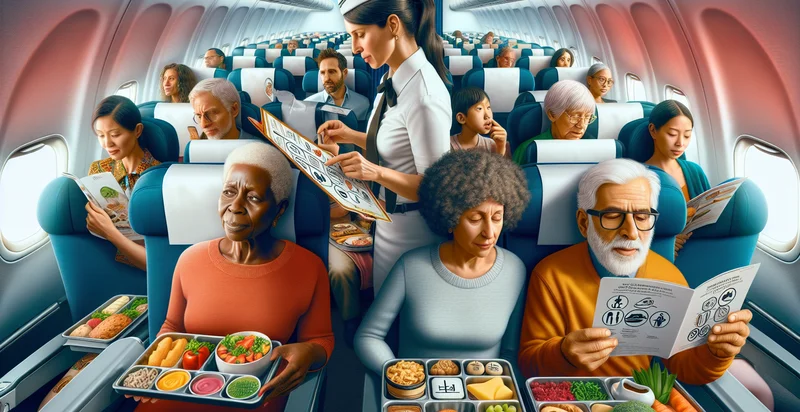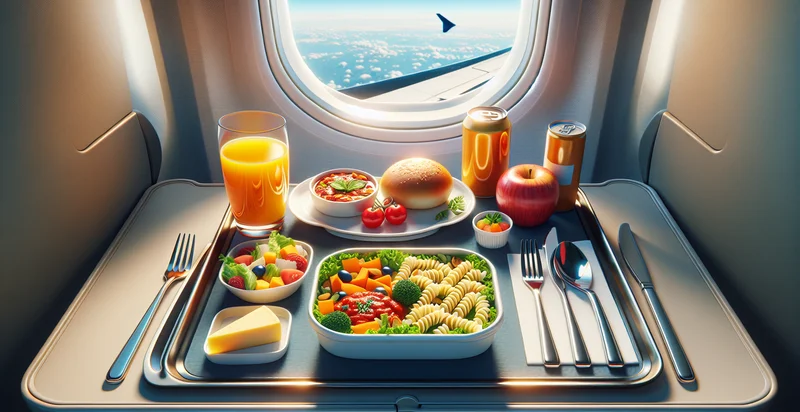Identify passenger dietary restrictions
using AI
Below is a free classifier to identify passenger dietary restrictions. Just input your text, and our AI will predict what dietary restrictions passengers may have - in just seconds.

Contact us for API access
Or, use Nyckel to build highly-accurate custom classifiers in just minutes. No PhD required.
Get started
import nyckel
credentials = nyckel.Credentials("YOUR_CLIENT_ID", "YOUR_CLIENT_SECRET")
nyckel.invoke("passenger-dietary-restrictions", "your_text_here", credentials)
fetch('https://www.nyckel.com/v1/functions/passenger-dietary-restrictions/invoke', {
method: 'POST',
headers: {
'Authorization': 'Bearer ' + 'YOUR_BEARER_TOKEN',
'Content-Type': 'application/json',
},
body: JSON.stringify(
{"data": "your_text_here"}
)
})
.then(response => response.json())
.then(data => console.log(data));
curl -X POST \
-H "Content-Type: application/json" \
-H "Authorization: Bearer YOUR_BEARER_TOKEN" \
-d '{"data": "your_text_here"}' \
https://www.nyckel.com/v1/functions/passenger-dietary-restrictions/invoke
How this classifier works
To start, input the text that you'd like analyzed. Our AI tool will then predict what dietary restrictions passengers may have.
This pretrained text model uses a Nyckel-created dataset and has 25 labels, including Anti-Inflammatory, Caffeine-Free, Celiac, Dairy-Free, Diabetic-Friendly, Egg-Free, Fodmap Friendly, Fructose Intolerant, Gluten-Free and Halal.
We'll also show a confidence score (the higher the number, the more confident the AI model is around what dietary restrictions passengers may have).
Whether you're just curious or building passenger dietary restrictions detection into your application, we hope our classifier proves helpful.
Related Classifiers
Need to identify passenger dietary restrictions at scale?
Get API or Zapier access to this classifier for free. It's perfect for:
- Airline Meal Planning: Airlines can utilize the passenger dietary restrictions identifier to automatically categorize travelers based on their dietary needs. This enables them to tailor in-flight meal offerings, ensuring that all passengers receive suitable meals without significant delays.
- Customer Support Enhancement: Airlines can improve their customer support experience by integrating this identifier into their chat and phone systems. By automatically detecting and flagging dietary restrictions, representatives can quickly address passenger concerns and offer personalized service, reducing response times and increasing satisfaction.
- In-flight Advertising Personalization: Utilization of the identifier can help airlines target in-flight advertisements and promotions more effectively. For example, passengers with vegetarian or gluten-free dietary restrictions could receive relevant offers for products and services that align with their needs, enhancing customer experience and potential sales.
- Loyalty Program Customization: Airlines can leverage the dietary restrictions identifier to tailor loyalty program rewards that align with the dietary preferences of frequent travelers. By offering rewards such as meal credits for specific dietary options, they can enhance engagement and retention among their customer base.
- Travel Partner Collaboration: Travel agencies and hotels can integrate this identifier to provide a seamless experience for their clients. Sharing dietary restriction information with partners allows for better meal planning in restaurants and catering services, ensuring customer satisfaction and reducing last-minute adjustments.
- Health and Safety Compliance: In light of growing health and safety standards, airlines can employ the identifier to ensure compliance with food regulations that cater to dietary restrictions. This proactive approach can help minimize the risk of allergic reactions and other health-related issues during travel.
- Data Analytics for Caterers: Through the identifier, airlines can gather valuable data on dietary trends and preferences, which can be shared with catering vendors. This data-driven insight allows caterers to optimize their menu offerings to better cater to the actual preferences of passengers, leading to improved service quality and customer satisfaction.


